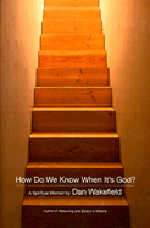 (Reprinted with permission from the Los Angeles Times Book Review, written by Jonathan Kirsch.)
(Reprinted with permission from the Los Angeles Times Book Review, written by Jonathan Kirsch.)
Dan Wakefield is an escapee from the circle of hell known as the entertainment industry, a self-described “cocky, carousing, hotshot novelist-turned-television writer” who stopped writing novels and scripts and started writing earnest memoirs, including Returning: A Spiritual Journey and Expect a Miracle. Now Wakefield asks himself the ultimate question of the spiritual seeker, a question that is framed in the title of his latest book, How Do We Know When It’s God?. “Through all these highs and lows of the spirit over nearly two decades, I never in the deepest pit lost faith in God,” confesses Wakefield. “What I did lose faith in was my own discernment, my own ability to answer the question: How do we know when it’s God?”
Wakefield’s spiritual journey is emblematic of the experience of his own restless generation. Wakefield tried psychotherapy and prayer, tranquilizers and tai chi. He gave up drinking and took up yoga. He worked on bringing down his weight and his blood pressure in the hope that it would lift up his spirit. He joined a church that advertised on the religion page of the Boston Globe “because it’s in walking distance and the promise of ‘candlelight service and carols’ doesn’t seem too threatening.”
He may have been reborn as a spiritual seeker, but Wakefield’s sense of humor is still in good working order—and he does not spare himself from his own barbed wit. “Hey, as an old Eagle Scout and refurbished Christian, I’m ready to get my next instructions, as eager as if I’m about to earn my merit badge in Jesus!” he writes of an experience at a Jungian seminar on the life of Jesus at a retreat in Northern California. “OK, a change of plans for the summer—now it’s just me, Jesus and the Jungians.”
What evades him, however, is an unambiguous and unmediated experience of God, the moment of revelation that has been the goal of just about every saint, guru, and shaman in the history of religion. “I haven’t lost faith in God, but I’ve lost faith in words as communication with the Holy Spirit,” writes Wakefield of a moment during his own dark night of the soul in the aftermath of a failed marriage. Ironically, he is forced to resort to language to describe how language failed him: “I don’t want words of any kind, whether Sanskrit or English, Hindu or Christian. I want to be baptized in silence.” Yet Wakefield’s book is strikingly chatty for a spiritual memoir. He delights in dropping names and recreating conversations with a lifetime’s accumulation of friends and colleagues, ranging from James Baldwin to Rabbi Harold Kushner. And he keeps us informed of what is going on in his heart and mind at every step along the spiritual path. “I’m grateful to find my way back to prayer with words,” writes Wakefield in one telling aside. “I keep finding that community is a key ingredient of spirituality.”
Wakefield never actually answers the question that he poses in the title of his book, but he cannot be faulted for bumping up against the wall between faith in God and some direct experience of God, a barrier that has stopped all of the seekers who have come before him. On one occasion in childhood, he tells us that he felt his body “filling with light,” and he believed that “the light is Christ.” As an adult, however, he yearns in vain for a similar encounter, and he must content himself with oblique and indistinct sensations. About the closest he comes to God is a moment when “a feeling of extraordinary goodness and peace” comes over him, or another moment “when I feel or sense a hand holding my own right hand.”
But, as Wakefield himself tells us at the outset, “this is a ‘how not do it’ book,” and, for that reason, his book “may prove more useful and perhaps more encouraging to other stumbling pilgrims than the tomes that so confidently tell us the five or seven or ten easy steps to fulfillment, satori, salvation, and material (as well as spiritual) success.”